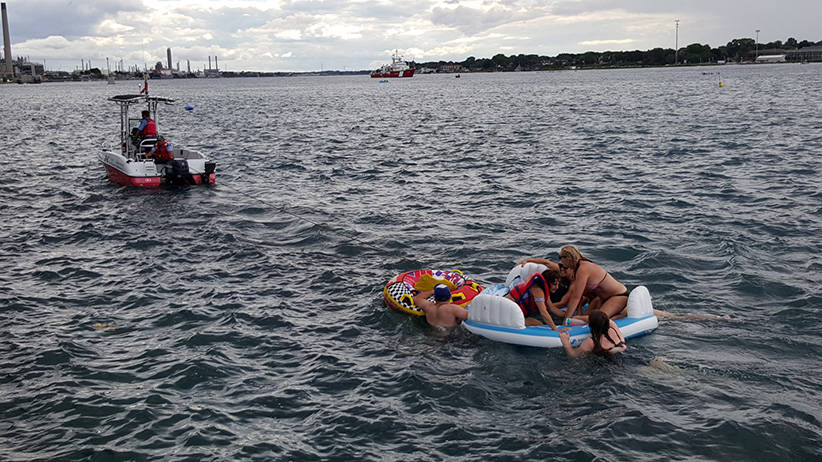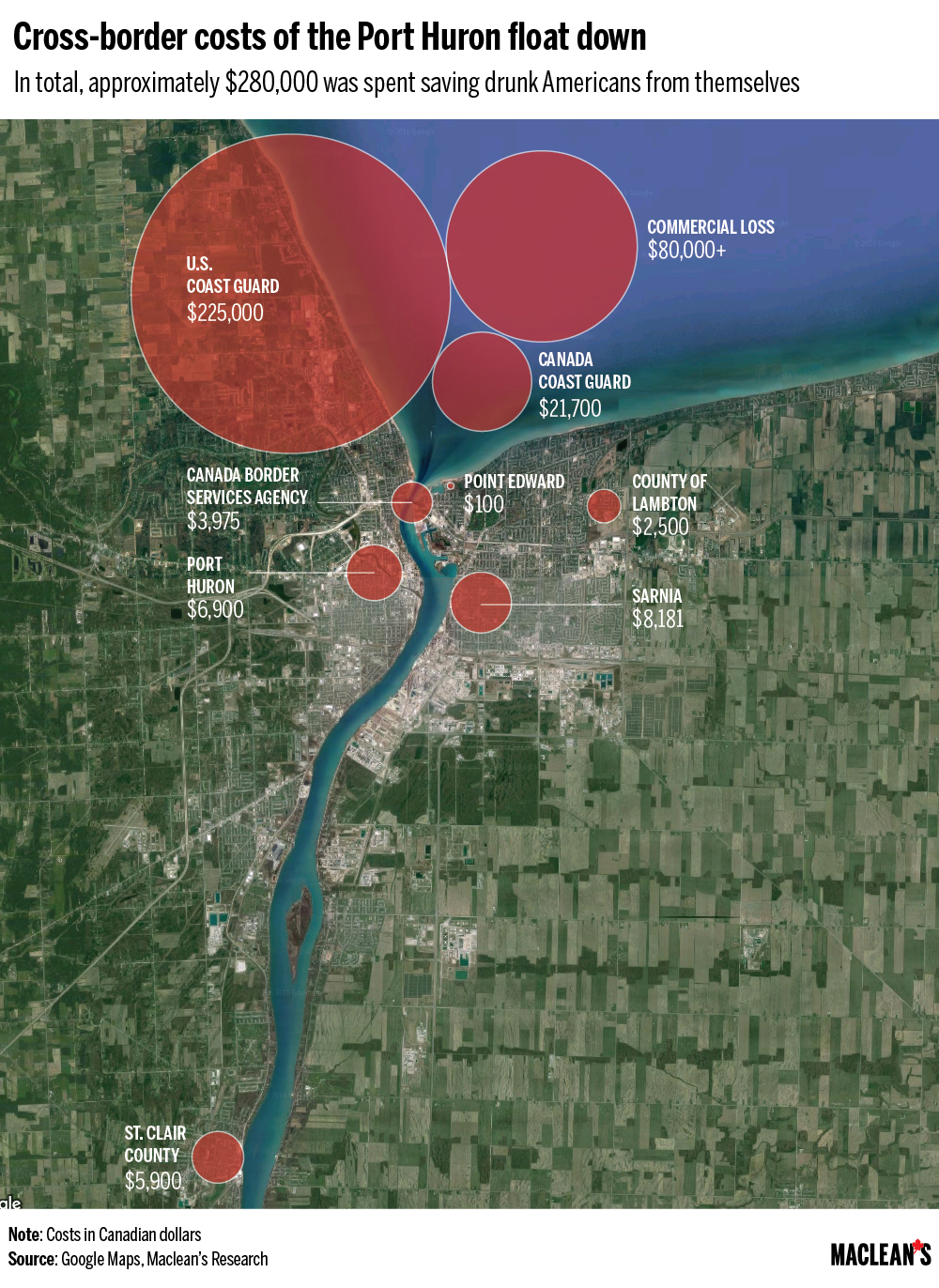What it really cost to save 1,500 drunk Americans: $280,000
From helicopters on emergency standby to cleaning up beer cans on the beach, we tally the total bill of the Port Huron Float Down gone awry
A Canadian Coast Guard ship tows floatation devices used by U.S. partiers to the Canadian side of the St. Clair River between Michigan and Ontario on August 21, 2016. About 1,500 Americans ended up in Canada after getting hit by strong wind and rain. (Canadian Coast Guard/Reuters)
Share

It’s been just under a week since 1,500 inebriated Americans took to the St. Clair River between Michigan and Ontario in inflatable rafts, triggering a minor border security crisis and a massive rescue effort and clean-up operation. But only now are we seeing the final costs of the annual Port Huron Float Down event, which went awry when strong winds blew the rafters into Canadian waters near Sarnia, Ont., coming to light.
In response to the debacle, our neighbours to the south started a GoFundMe page to recoup the costs for Sarnia, which topped $8,000 as the city paid to bus thousands of Americans back home, and so far the crowdsourcing initiative has raised $5,000. It’s a nice gesture, but it will hardly put a dent in the full cost of the unsanctioned event, once expenses for the U.S. and Canadian coast guards are included, not to mention the impact to commercial vessels that were blocked from using the river for eight hours during the event.
So how much did it cost to help the tubing drifters—between the foreseen and unforeseen costs on both sides of the border? Here’s a full breakdown, and perhaps a new GoFundMe fundraising goal:
Here’s a full breakdown of the costs.
UNITED STATES
U.S. Coast Guard: $225,000
- 30 active duty members involved
- four boats, each one staffed with four fully qualified vessel operator
- a helicopter on emergency standby with two pilots
- air crew command staff
- 11 hours of active duty time
Port Huron Police and Fire Departments: $6,900 (Note: does not include related expenses such as boat fuel.)
St. Clair County Sheriff’s Office: $5,900
- Sheriff’s Office Marine Division: $2,700
- Sheriff’s Office Dive Team: $3,200
CANADA
Canadian Coast Guard: $21,700
- The Canadian Coast Guard ship Limnos
- An on-scene command vessel
- Several fast rescue craft
City of Sarnia: $8,181.77
- Sarnia Police Service: $3,405
- Sarnia Transit: $1,977.97, for 10 buses and supervisory staff making 19 trips to U.S. side of Bluewater Bridge
- Sarnia Public Works Department: $712.40, for closure of streets for the purpose of convening U.S. citizens
- Sarnia Fire Rescue Services: $1,435.88, for a Marine Unit on the water, fire apparatus, rescue truck, and crew members to assist on land
- Sarnia Parks and Recreation Department: $649.60, for garbage cleanup on the Canadian shore
Canada Border Services Agency: $3,975
- Six officers re-assigned to designated marinas, plus time and resources for preparation prior to the event.
Point Edward Fire Department: $100
- $100 in boat fuel
- 50 man hours of volunteer time from firefighters
County of Lambton Emergency Medical Services Department: $2,500
- $2,500 for supplies, mostly blankets
- Two ambulances and a supervisor on the site for a number of hours, of which the cost is approximately $2,000, though they were already on duty
COMMERCIAL
Estimated cost due to delays for commercial vessels: More than $80,000
- When the eight-hour temporary restriction on vessel traffic was lifted at 8 p.m. there were eight commercial ships waiting to pass through the St. Clair River. The Chamber of Shipping roughly estimates the downtime for each operator costs $10,000 to have a ship anchored for an eight-hour waiting period, not to mention the costs to businesses for the delayed arrival of supplies.
OTHER
RCMP: No dollar amount provided. One member from Sarnia Detachment was on a regular shift and three members from Windsor Shiprider worked 12-hour overtime shifts
Sarnia Red Cross: Four volunteers provided 35 to 40 blankets to rafters.
